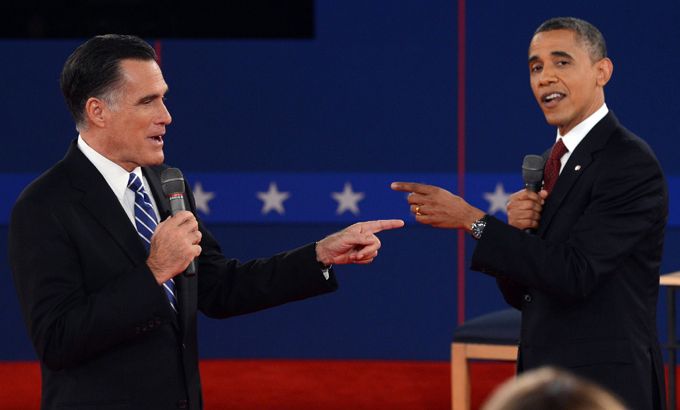Obama and Romney meet in combative debate
President and his Republican rival meet for “town hall”-style debate, the second of the campaign.

Barack Obama, the US president, and Mitt Romney, his Republican rival, faced off in their second high-stakes debate in New York.
Tuesday’s 90-minute debate at Hofstra University in Hempstead, New York, offered both candidates their best chance for a breakout moment with time running out in what promises to be one of the closest presidential contests in recent US history.
The pressure was on Obama who has vowed to put up more of a fight in an effort to overcome his lackluster, momentum-stalling performance in the candidates’ first debate on October 3.
In a Reuters/Ipsos daily tracking poll on Tuesday, Obama gained ground on Romney for the third straight day, leading 46 per cent to 43 per cent.
“I think you’ll see somebody who will be strong, who will be passionate, who will be energetic, who will talk about … not
just the last four years but what the agenda is for the future and how we continue to move … our economy forward,” Robert Gibbs, senior Obama campaign advisor, said on US television.
This debate will see both candidates engage in a town hall format, which will require the incumbent and the former Massachussets governor addressing questions from an audience of undecided voters.
The town hall format lets the candidates “talk directly to people and look them in the eye and try to connect, which has
not been a strength for either of them,” Andrew Taylor, University of North Carolina political scientist, said.
“But you can still make strong points with a velvet glove.”
Al Jazeera’s Alan Fisher, reporting from Hempstead, said tonight’s debate will likely see Romney move towards the centre.
“He’s moving to the centre to try and attract the independents, the undecided” and some wayward Obama supporters, said our correspondent.
Battleground states
Romney will likewise need to turn in a repeat of his strong showing in the initial face-to-face-confrontation, a performance which propelled him into a virtual tie in nationwide polling.
Obama still hangs on to small leads in many of the nine key swing states that are likely to determine which man occupies the White House on Inauguration Day on January 20.
The so-called battleground states – those that do not reliably vote either Republican or Democratic – take on outsized importance in the US system where the president is chosen not by the nationwide popular vote but in state-by-state contests.
A Gallup/USA Today poll published on Tuesday showed the two had similar favorable ratings from registered voters. But the survey showed Romney ahead of Obama by four percentage points among likely voters in the 12 battleground states.
The candidates will take questions on domestic and foreign policy from an audience of about 80 of the coveted uncommitted voters whom both campaigns are so furiously courting.
With early voting already under way in dozens of states, including such battlegrounds as Ohio and Iowa, the candidates will have little time to recover from any missteps in the debate.
Through Monday, either absentee or in-person early voting had begun in 43 of the 50 states.
In the first debate, Obama seemed caught unawares and unprepared to respond to Romney’s sudden shift to more moderate positions from the hardline policies he had advocated during the fight for the Republican nomination.
The candidates will engage in a final debate next Monday in Boca Raton, Florida, where the emphasis will be on US foreign policy.